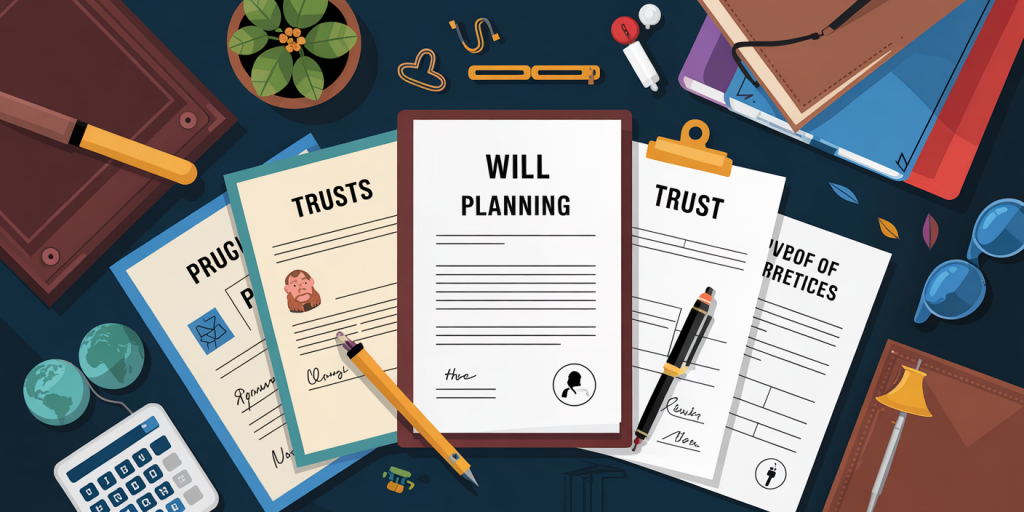What Is Estate Planning and Why You Should Think About It Now
Estate planning is a critical but often overlooked aspect of personal finance and wealth management. Far from being an exclusive concern for the elderly or ultra-wealthy, estate planning encompasses a wide range of strategies designed to manage and protect your assets during your lifetime and ensure a smooth transfer after your passing. With increasing life expectancies and growing family complexities, understanding estate planning and taking timely action can make a profound difference for you and your heirs.

Understanding the Basics of Estate Planning
At its core, estate planning involves creating a comprehensive framework to manage your finances, assets, healthcare decisions, and end-of-life wishes. It typically includes drafting legal documents such as wills, trusts, power of attorney, and healthcare directives. The goal is to ensure your estate is distributed according to your wishes while minimizing taxes, legal disputes, and administrative delays.

For example, consider the case of Steve Jobs, the co-founder of Apple Inc. Though incredibly wealthy, his estate planning decisions were private, but high-profile estates like his often undergo meticulous planning to avoid protracted court battles or excessive estate taxes. On the other hand, many families face challenges when there is no clear plan, resulting in costly probate processes and family disputes.
According to a 2023 survey by Caring.com, only 32% of American adults have a will, despite 88% expressing that having one is important. This gap highlights a common hesitation or lack of awareness around estate planning, emphasizing why it is essential to start thinking about it sooner rather than later.
Key Components of an Estate Plan
An effective estate plan usually comprises several key components, each serving a specific function. A will is the most basic document, expressing your final wishes concerning asset distribution and guardianship for minor children. Without a will, your estate is subject to state laws of intestacy, which may not reflect your preferences.
Trusts offer more sophisticated control over your assets. For example, a revocable living trust allows you to maintain control during your lifetime and transfer assets seamlessly upon death, often bypassing probate. Irrevocable trusts can protect assets from creditors and reduce estate taxes but require relinquishing control.
Another critical document is the power of attorney, which designates someone to manage your financial or legal affairs if you become incapacitated. Similarly, healthcare directives—such as living wills or medical powers of attorney—guide decisions if you cannot communicate your wishes.
A practical case can be seen in the story of singer Prince, who passed away in 2016 without a will or trust, leading to a complex and costly legal process that tied up his estate for years and delayed inheritance for his family.
| Estate Planning Component | Purpose | Benefits | Considerations |
|---|---|---|---|
| Will | Specifies asset distribution and guardianship | Simple to draft, legally binding | Subject to probate |
| Revocable Living Trust | Manages assets during lifetime and after death | Avoids probate, privacy protection | Can be more costly and complex |
| Irrevocable Trust | Protects assets and reduces taxes | Safeguards assets, tax benefits | Relinquishes control |
| Power of Attorney | Assigns decision-maker for finances | Ensures management in incapacity | Must choose trustworthy agent |
| Healthcare Directive | Communicates medical wishes | Guides healthcare providers | Must be clear and updated |
Why You Should Start Estate Planning Now
Waiting to initiate estate planning can introduce significant risks. Life is unpredictable, and planning ahead can prevent chaotic situations for your loved ones. Disabilities, accidents, or sudden health issues don’t wait for an “ideal time.” Establishing a plan early mitigates the burden on your family and ensures decisions align with your values.
Furthermore, estate planning is not just about preparing for death—it also helps with wealth management during your lifetime. Utilizing trusts can aid with asset protection against lawsuits or creditors. Tax planning strategies embedded within estate plans can preserve more wealth for your heirs.
Consider the example of a blended family where children from previous marriages are involved. Without a well-crafted estate plan, assets might unintentionally go to the current spouse, excluding biological children, potentially causing legal disputes and family divisions.
From a financial perspective, the IRS reported that in 2024, estates valued above $12.92 million per individual are subject to federal estate taxes, and without proper planning, families can face tax bills that significantly diminish inheritances. Even if you believe your estate is too small to be taxed, state inheritance laws vary widely, and associated probate costs can be burdensome.
Common Misconceptions About Estate Planning
Many people delay estate planning due to misconceptions. One is the belief that estate planning is only for the wealthy. In reality, everyone with assets—property, retirement accounts, life insurance, or even digital assets—can benefit. Without proper documents, the state decides what happens to your property, which might not align with your wishes.
Another myth is that estate planning is a “one-and-done” process. However, life changes such as marriage, divorce, birth of children, buying real estate, or changes in tax laws necessitate periodic reviews and updates to your estate plans to reflect current circumstances.
Some individuals also fear that creating a will or trusts involves complex and expensive legal procedures. While some situations require professional assistance, many straightforward wills or healthcare directives can be drafted affordably and even through online services.
Practical Steps to Begin Your Estate Plan
Starting your estate planning journey can seem overwhelming, but breaking it down into manageable steps can help. First, inventory your assets—real estate, bank accounts, investments, personal valuables, and digital property. Knowing what you own clarifies what needs to be protected and distributed.
Next, identify your beneficiaries and guardians, if applicable. Consider who you trust to manage your financial and healthcare decisions and who you want to benefit from your estate. Communicate these decisions with family members to reduce misunderstandings later.
Engaging with professionals such as estate planning attorneys or financial advisors can provide tailored advice, especially for complex estates. These experts help you navigate tax implications, legal formalities, and ensure your plans meet state laws.
Finally, ensure all documents are signed, notarized if required, and accessible. Inform trusted individuals about the existence of your estate plan and where to find documents.
Looking Ahead: Future Trends in Estate Planning
Estate planning is evolving due to changes in technology, law, and societal norms. Digital assets—social media accounts, cryptocurrencies, online businesses—are becoming increasingly integrated into estate plans. The need to address these assets explicitly is growing; for instance, legislation around digital inheritance varies by jurisdiction.

Additionally, as life expectancies rise, planning for long-term care and healthcare costs is getting more intricate. Tools like long-term care insurance and hybrid life insurance policies are becoming part of comprehensive estate strategies.
Legal reforms also influence estate planning. Recent changes in estate tax thresholds, the expansion of portability between spouses, and modifications to trusts reflect ongoing adaptation. Moreover, the COVID-19 pandemic heightened awareness about powers of attorney and healthcare directives, encouraging more people to prepare for sudden incapacitation scenarios.
Environmental and ethical considerations are gaining traction too. Some individuals now seek “green” estate planning options, focusing on sustainable asset management or charitable giving that supports ecological causes.
By anticipating these trends, individuals can craft more resilient and forward-thinking estate plans that align with their values and changing legal landscapes.
—
Estate planning is a vital aspect of financial well-being that transcends age and wealth status. By understanding its components, dispelling myths, and taking practical steps, you ensure your legacy is secure and your loved ones are cared for. The earlier you start, the more control you maintain over your assets and future. As life evolves, staying informed and updating your plan keeps you prepared for the unexpected and embraces emerging opportunities in estate management.
